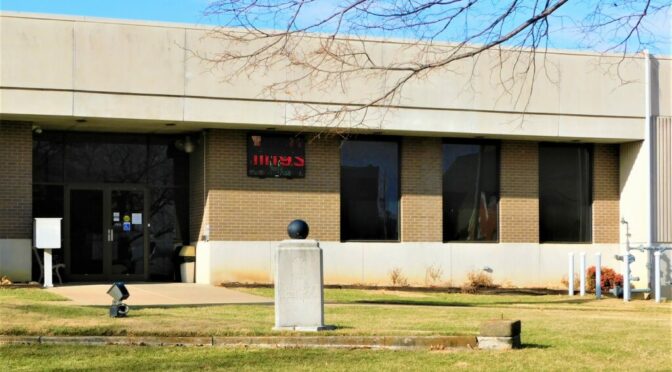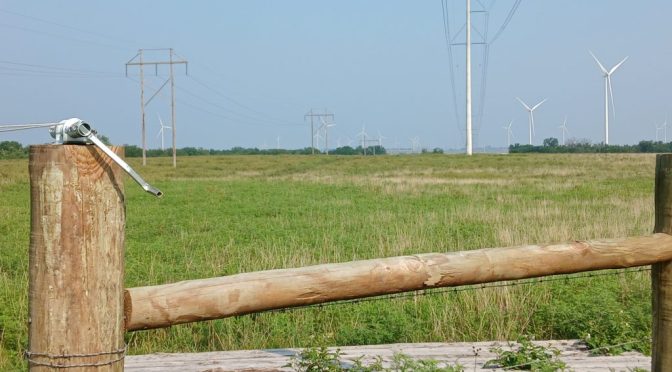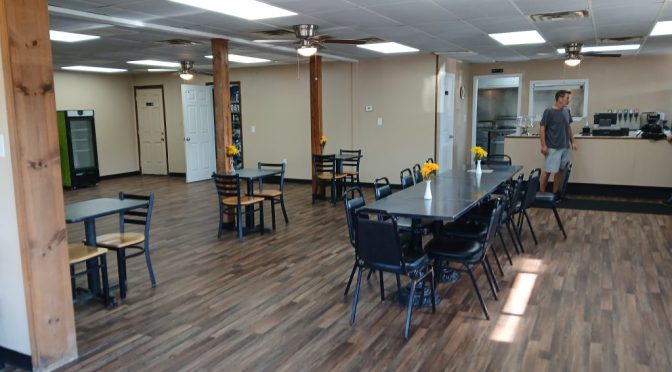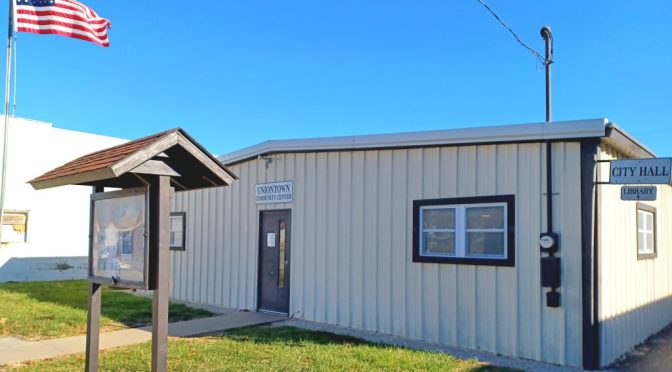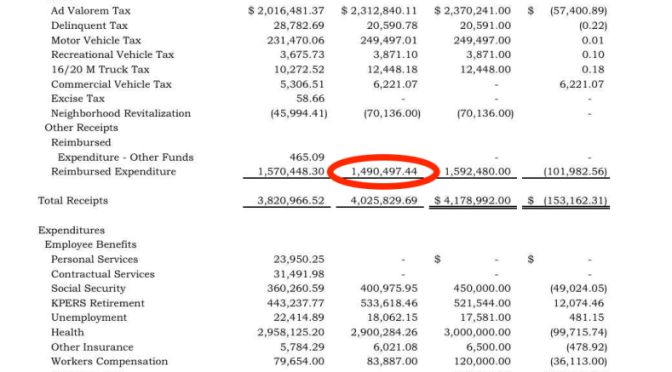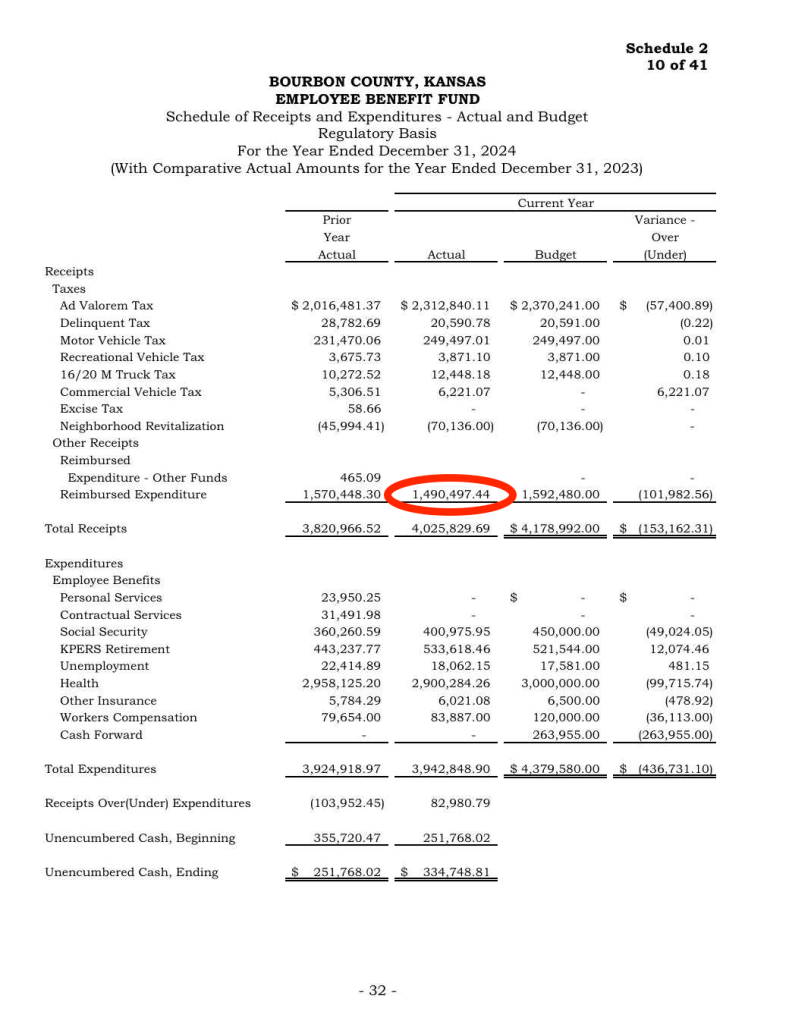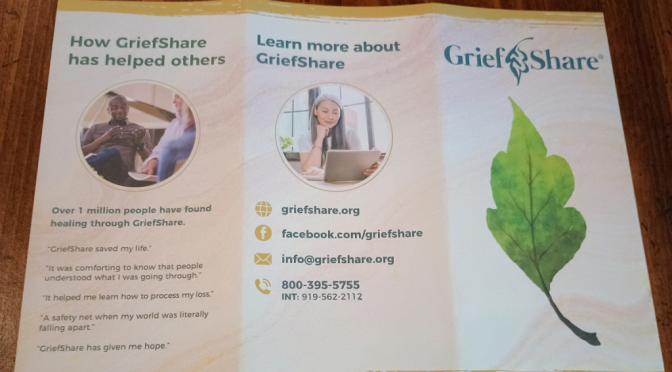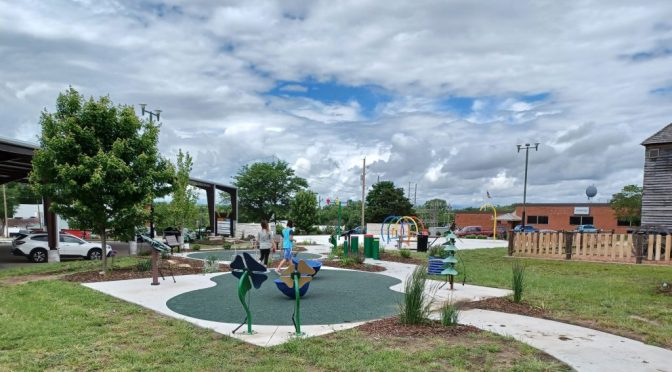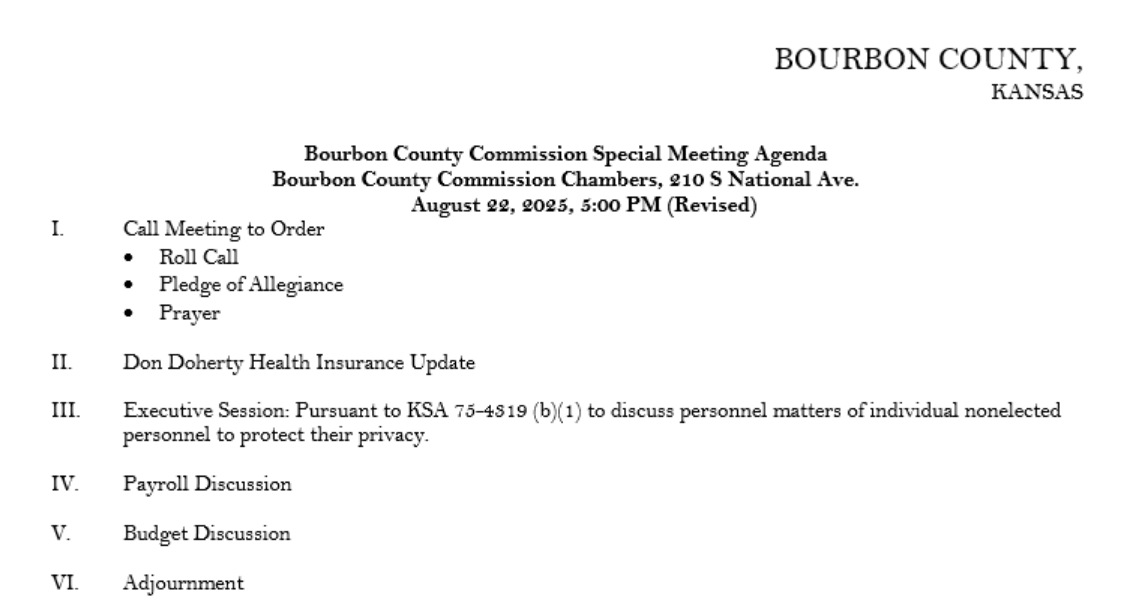
Category Archives: Bourbon County
Bourbon County Commission Holds Special Meeting Today at 5 p.m.
There will be a special meeting today, 08.22.25, at 5:00 PM at 210 S National Avenue. Below is the agenda.
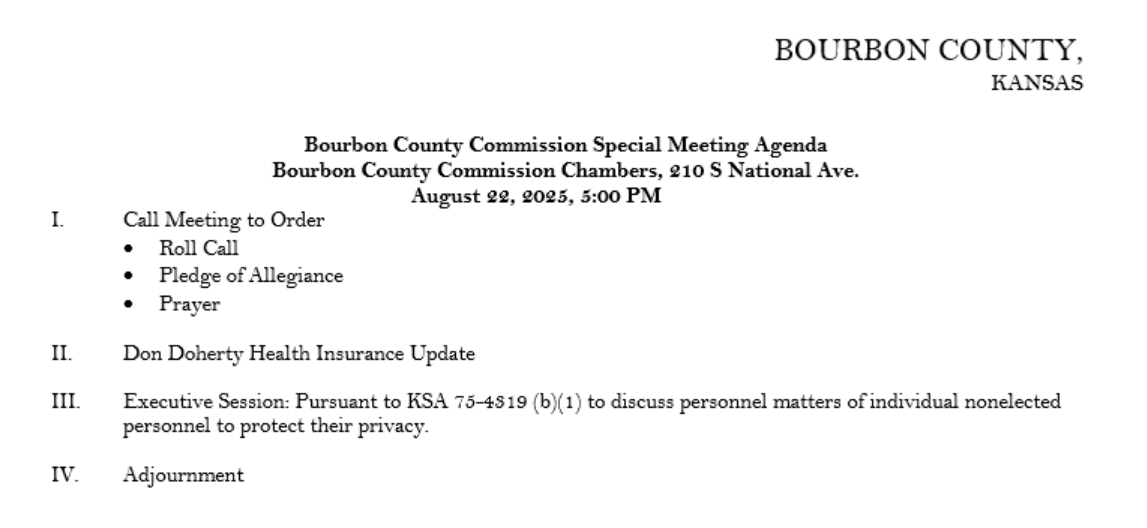
Susan E. Walker
Bourbon County Clerk
210 S National Avenue
Fort Scott, KS 66701
620.644.7927 Direct Line
Posting…
Video Links for Bourbon County Budget Advisory Committee Work Session 8-21-25
Bourbon County Budget Advisory Committee Work Session 8-21-25
These links should take you to the appropriate parts of the video of the meeting.
-
00:00–05:00 — Meeting opening and Pledge of Allegiance
-
05:00–14:50 — Initial discussion of 911 dispatch funding and city contribution of $350,000
-
14:50–33:46 — Discussion of asphalt agreement with city and pricing concerns
-
Historical pricing agreements
-
Current needs of city (2,300 tons needed)
-
Debate over maintaining previous pricing agreements
-
-
33:46–45:00 — Budget reductions and department funding discussion
-
Employee benefits cuts
-
Cash reserve reductions
-
Public safety funding priorities
-
-
45:00–75:00 — Detailed budget analysis
-
Department budget cuts
-
Mill levy discussions
-
Revenue projections
-
Cash reserve concerns
-
-
75:00–95:00 — Discussion of employee benefits and salary philosophy
-
Current benefit rates vs market rates
-
Strategy for future compensation structure
-
Impact of Affordable Care Act compliance
-
-
95:00–115:00 — Budget process and financial management
-
Role of elected officials in budget management
-
Statutory requirements
-
Future planning needs
-
-
115:00–122:36 — Closing discussions
-
Future budget planning recommendations
-
Need for city-county cooperation
-
Final comments from committee members
-
Bourbon County Is Connected to Southwest Power Pool Energy Project
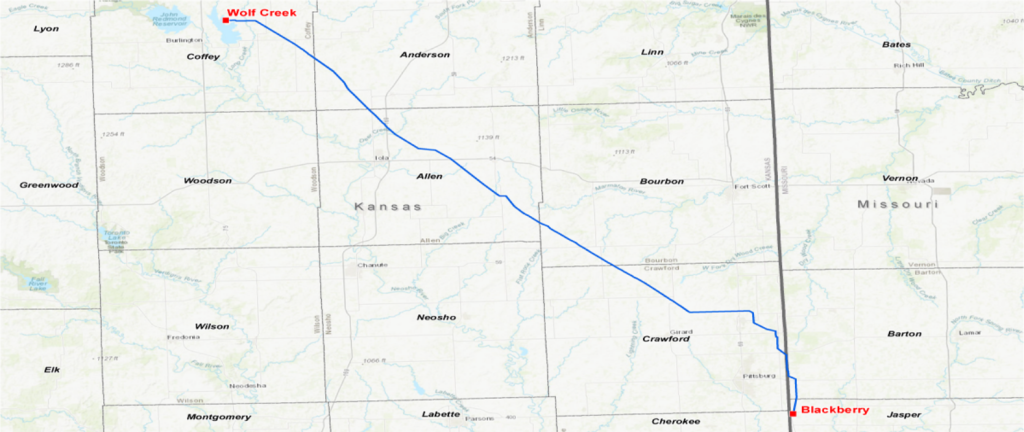
A power delivery project, many years in the making, has started transmitting energy through Bourbon County.
NextEra Energy Transmission (NEET) – Southwest began producing energy over the 92-mile, 345-kV Wolf Creek – Blackberry transmission line on July 16, 2025, according to Lillie Zeng, spokesperson for NEET-Southwest.
The project was within budget and nearly five months ahead of Southwest Power Pool’s (SSP) required in-service date. The project was completed within three years, according to the spokesperson.
This is the second of three competitively awarded transmission projects in SPP that the company is building, she said.
“NextEra Energy Transmission – Southwest is proud to support SPP and its customers in Kansas and Missouri with a transmission line that will help enhance grid reliability and support economic growth in the region.”
The NEET-Southwest field office is at 2522 Richards Road, Fort Scott, KS 66701.
“We are in the process of hiring local office staff. In addition, NEET Southwest has access to approximately 70 affiliate technical staff located in the project area,” according to the spokesperson.
The project included a diagonal power line through the southwest part of Bourbon County as noted in the graphic from NextEra.
The process can be summed up this way:
Electric power is generated by nuclear energy at the Wolf Creek Nuclear Plant near Burlington, Kansas in Coffee County.
The power is moved via transmission power lines to the southwest, to the Blackberry Electrical Substation, just over the state line in Missouri.
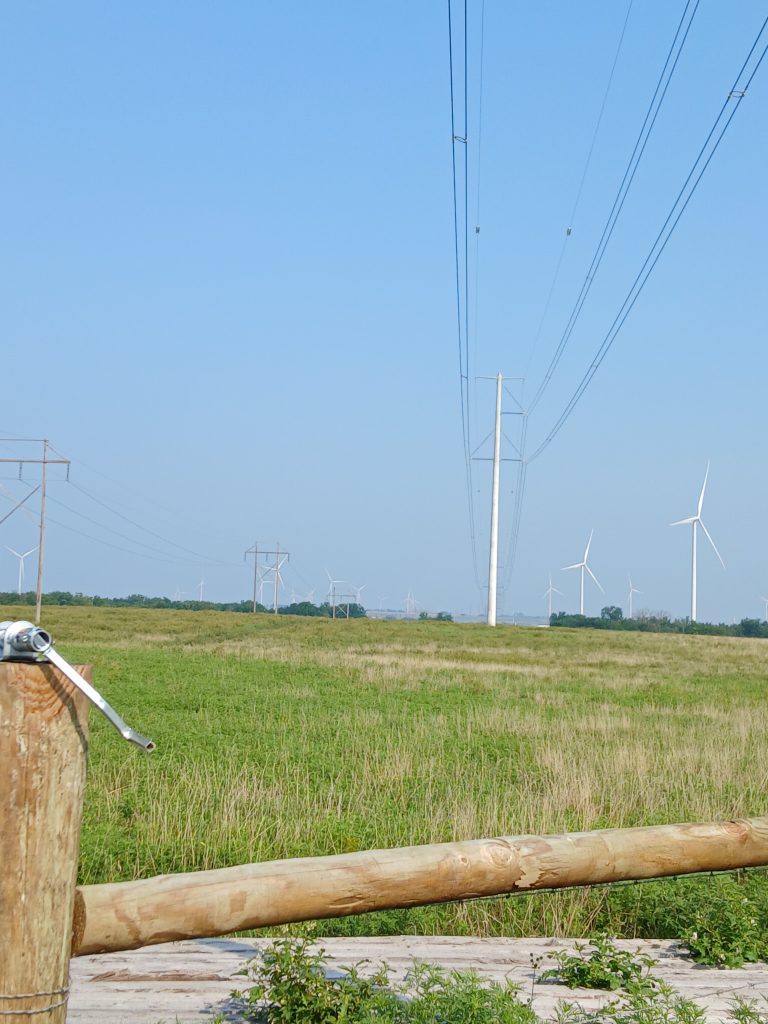
There, high voltage power is then stepped down to a lower voltage and distributed over power lines to neighborhoods, businesses, and residences, according to https://www.nexteraenergytransmission.com/subsidiaries/neetsw/projects/wolf-creek-blackberry
This project is a new 94-mile, 345-kilovolt (kV) regulated transmission line that runs from the Wolf Creek substation (Evergy Energy) in Kansas to the Blackberry substation, Associated Electric Cooperative Inc.(AECI) in Missouri.
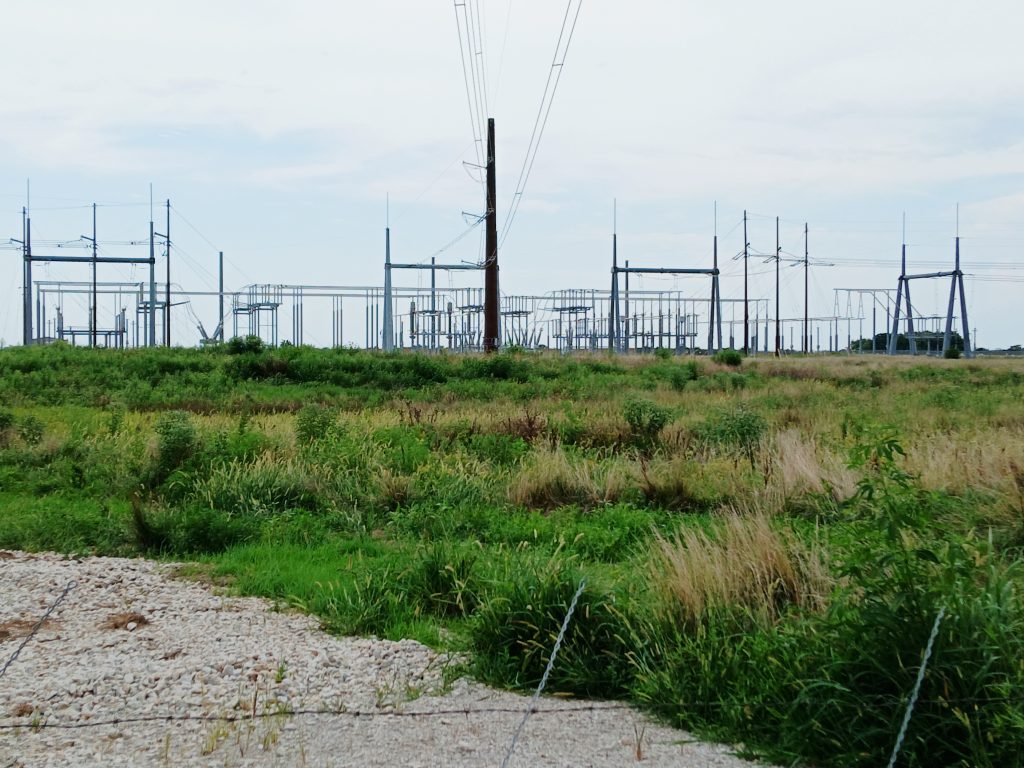
About Wolf Creek
Wolf Creek Nuclear Generating Station, Kansas’s only nuclear power plant, has been providing energy to Kansans and Missourians since 1985, according to https://www.evergy.com/landing/wolf-creek-nuclear-generating-station
The Wolf Creek site is about 10,500 acres, and 1,500 acres of company land are reserved and managed for wildlife. Wolf Creek employs approximately 750 employees, many of whom have worked at the site since the plant began providing electricity to the nation’s power grid more than three decades ago, according to the Evergy website.
Wolf Creek provides electric generation for Evergy and generates about 1,200 megawatts of electricity, which is enough energy to power more than 800,000 homes, according to the Evergy website.
Wolf Creek generates 20.7 percent of Kansas’ electricity, and 36 percent of its emissions-free electricity, according to the NextEra website.
Evergy is an electric service provider in Bourbon County.
“Evergy and Next Era are both members of the Southwest Power Pool (SPP), which helps manage the power grid and energy markets across 14 states in the middle of the country, including Kansas and Missouri,” said Evergy Director of Corporate Communications Gina Penzig. “SPP keeps track of how electricity moves through the system and helps ensure coordination among area utilities.”
“The Wolf Creek–Blackberry Transmission line simply connects to Evergy’s equipment and helps send electricity into the power grid,” Penzig said. “The SPP chose Next Era to build this line through a competitive bid process. Even though the line connects to Evergy’s substation and electricity flows through it, Next Era owns and operates the line.”
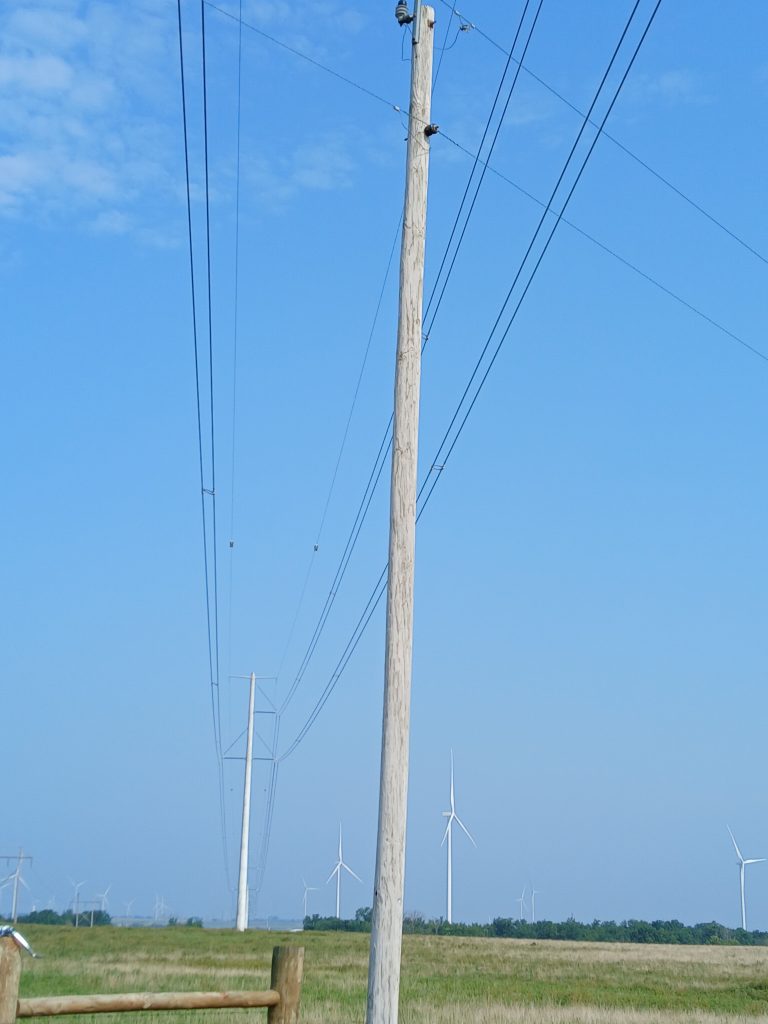
The project is part of the 2019 Integrated Transmission Plan approved by SPP in October 2019 to address the need for a more reliable and cost-effective grid. This project will reduce congestion and provide market efficiencies and benefits to ratepayers, according to the NextEra website.
According to NextEra, the project benefits are:
- “Leads to lower electricity costs for customers
- Enhances the reliability and resiliency of the electric grid
- Creates job opportunities in the short and long term
- Spurs investment in the local economy during construction
- Supports public health and safety through access to reliable electricity
“Environmental & Visual Considerations
-
Conducted rigorous environmental analyses to limit impacts on wildlife, sensitive habitats, and natural resources
-
Coordinated with federal and state agencies to identify protected species found along the route
-
Selected monopole structures to minimize tree clearing and agricultural impacts
-
Incorporated considerations for visual impacts into the routing study.”
Mapleton Cafe Reopens With New Owner
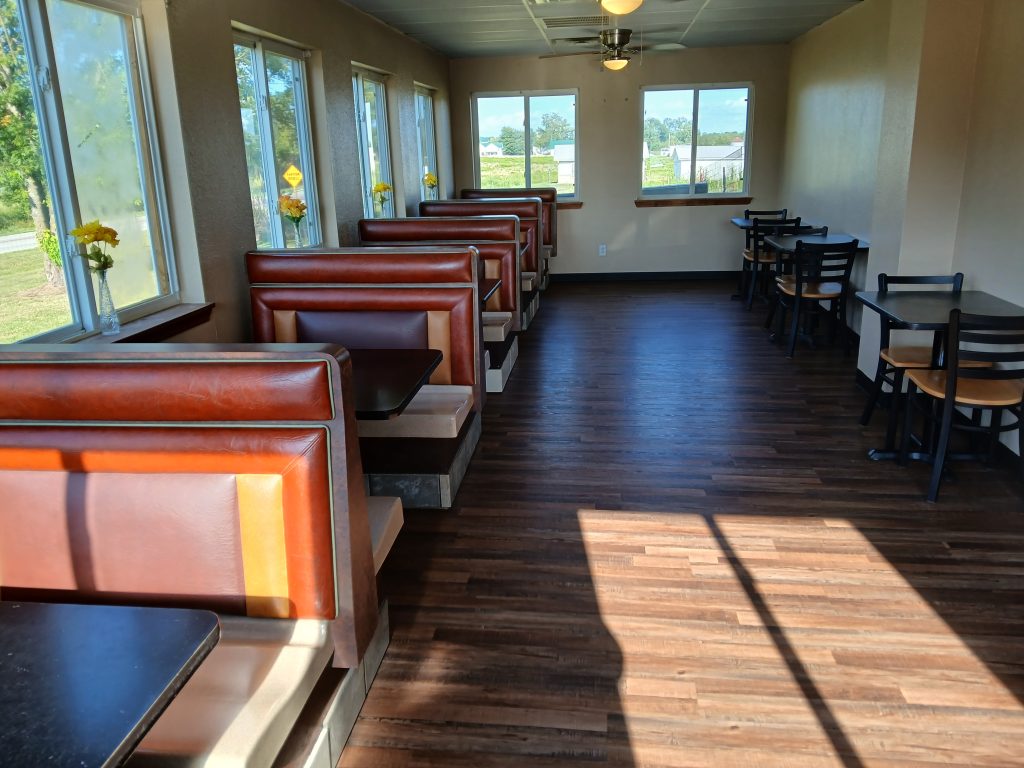
The Mapleton Cafe, located in rural northern Bourbon County, is under a new manager.
“This cafe had been shut down for eight years,” Adam Clay, the new owner/manager,” said. “Joe Bisogno owns the building.”
It opened at the end of July.
“I was given an opportunity to open my own business in the country, where I want to be,” Clay said. “I have always been drawn to the country. I lived in DeSoto. Panasonic moved into the area, and lots of people have moved in.”
“You need to seize an opportunity.”
He moved a fifth-wheel recreation vehicle to the site of the building in Mapleton, population 99, in January and started renovating the building.
“I had to fix it up. I moved here, living in the fifth-wheeler.”
Clay has 35 years in the hospitality business with a focus on kitchen, menu, costing, and trends in the food business.
“I come from the K.C. area, Desoto, and worked as a chef for a corporation in their test kitchen. I left my position with Goodsents in K.C. at the end of June to do this full-time. Up to then, I only worked on weekends.”
The restaurant passed the Kansas Department of Agriculture inspection in mid-July.
“Even though a lot of work needs to be done, with the help of the Mapleton City Council, the local residents, and Joe Bisogno, we’ll make it successful,” he said.
“I’m the only cook; there are two local people as employees, Shawn Mierkey and Zoe Charley, and other local people pitch in to help.”
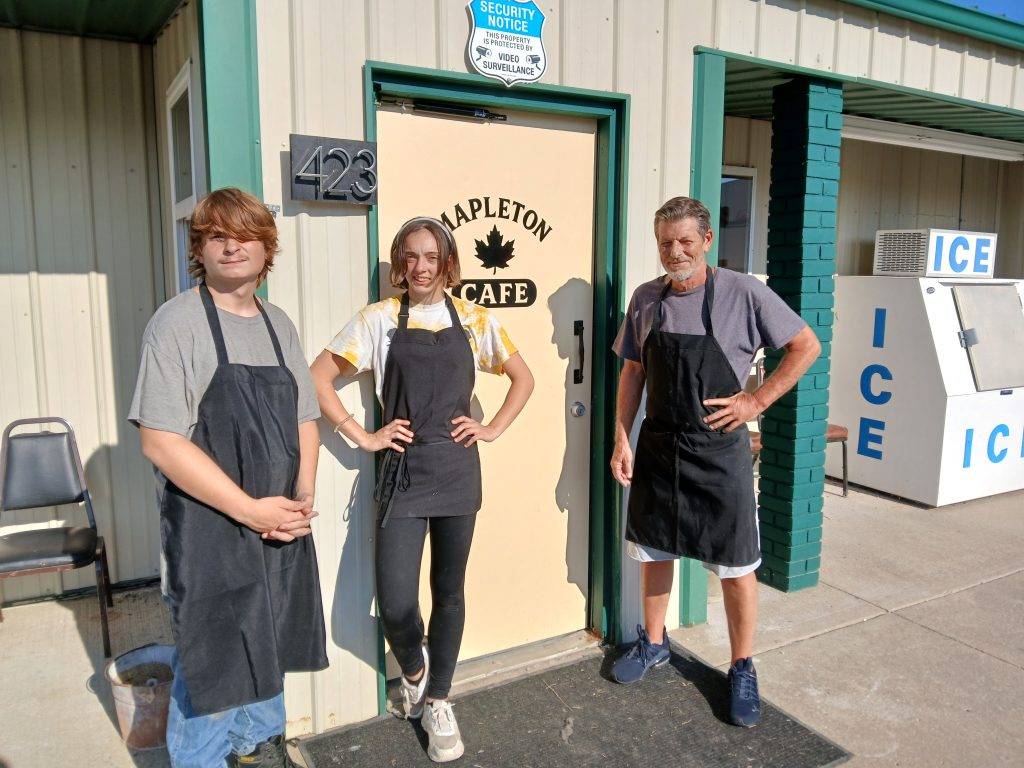
About the cafe
“It’s a country cafe with a modest breakfast and lunch menu,” he said. “It’s a starter menu. I’m still trying to figure out what works in this marketplace.”
“We are open to suggestions. A new dish for me is chili with a cinnamon roll and a pickle,” he said.
He said he is trying to keep the prices that fit this rural area.
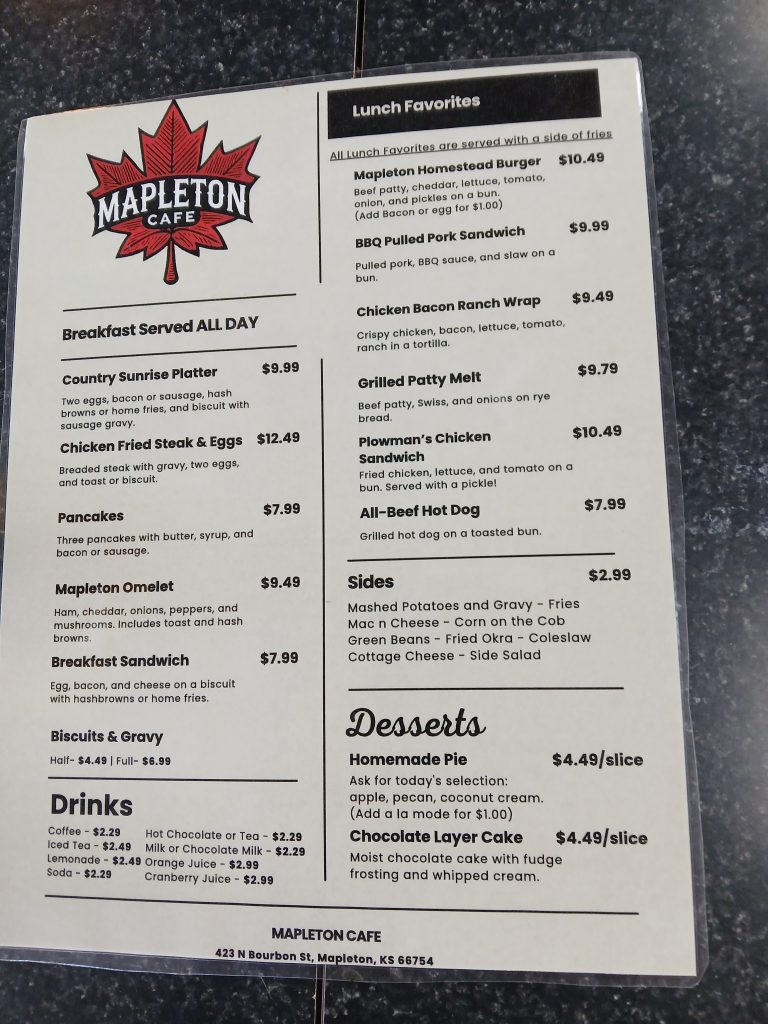
The restaurant is located at 423 N. Bourbon Street in Mapleton. Contact info: 785-813-6051. Hours of operation are Tuesday through Saturday from 6 a.m. to 3 p.m.
Unapproved Minutes of the Special Uniontown City Council Meeting on August 14
The Special Council Meeting on August 14, 2025 at Uniontown City Hall, was called to order at 5:00PM by Mayor Jurgensen. Council members present were Amber Kelly, Mary Pemberton, Savannah Pritchett, and Bradley Stewart. Also in attendance for all or part of the meeting, Interim City Clerk Sally Johnson.
Purpose of meeting is to hire/appoint non-elected personnel.
Motion by Stewart, Second by Kelly, Approved 4-0 to hire Haley Arnold for City Clerk position to start September 2, 2025 with 90 day probationary period
Moved by Kelly, Second by Pemberton, Approved 4-0, to adjourn at 5:07PM
Unapproved Uniontown City Council Minutes of the Meeting On August 12
The 2026 Budget Hearing and Regular Council Meeting on August 12, 2025 at Uniontown Community Center was called to order at 7:00PM by Mayor Jurgensen. Council members present were Jess Ervin, Amber Kelly, Mary Pemberton, and Bradley Stewart. Also in attendance for all or part of the meeting were Matt Kelly, Judy Cassidy, Haley Arnold, Leah Hall, Regan Bryant, Codes Enforcement Officer Doug Coyan, City Superintendent Bobby Rich, and City Treasurer/Interim City Clerk Sally Johnson.
SPECIAL CONSIDERATIONS/PROJECTS
2026 Budget Hearing –no citizens in attendance.
Motion by Ervin, Second by Kelly, Approved 4-0 to adopt the 2026 Budget as presented
2026 Budget Hearing closed.
CITIZENS REQUEST
None
FINANCIAL REPORT
Treasurer Johnson presented the July 2025 Treasurer’s Report. Beginning Checking Account Balance for all funds was $249,350.12, Receipts $26,400.57, Transfers Out $3,024.00, Expenditures $26,745.44, Checking Account Closing Balance $245,981.25. Bank Statement Balance $254,478.97, including Checking Account Interest of $53.64, Outstanding Deposits $0, Outstanding Checks $8,497.72, Reconciled Balance $245,981.25. Water Utilities Certificates of Deposit $38,287.32, Sewer Utilities Certificate of Deposit $22,987.37, Gas Utilities Certificates of Deposit $45,153.41, Total All Funds, including Certificates of Deposit $352,409.35. Year-to-Date Interest in Checking Acct is $424.17, and Utility CDs $1,273.42 for a Total Year-to-Date Interest of $1,697.59. Also included the status of the Projects Checking Account for the month of July 2025, Beginning Balance $0, Receipts $0, Expenditures $0, Ending Balance $0. July Transfers from Sewer Utility Fund to Sewer Revolving Loan $1,402.00; from Water Utility Fund to GO Water Bond & Interest $1,622.00 for Total Transfers of $3,024.00. Net Loss for the month of July $3,368.87, Year-to-Date Net Loss $17,882.49. Budget vs Actual Gas Fund YTD Revenue $98,877.38 (73.4%), Expenditures $73,404.11 (48.1%); Sewer Fund YTD Revenue $20,424.04 (54.9%), Expenditures $32,494.65 (70.5%); Water Fund YTD Revenue $64,418.94 (52.0%), Expenditures $68,270.29 (42.8%); General Fund YTD Revenue $100,366.09 (67.0%), Expenditures $153,430.62 (71.8%); and Special Highway YTD Revenue $3,886.52 (53.5%), Expenditures $3,047.95 (42%). The August 2025 payables to date in the amount of $38,721.19 were presented. The invoices from KMGA and Johnson Vaughn, PA have not been received by noon meeting day.
CONSENT AGENDA
Motion by Ervin, Second by Pemberton, Approved 4-0, to approve Consent Agenda:
- Minutes of July 8, 2025 Regular Council Meeting, July 19, 2025 Special Meeting, July 19, 2025 Budget Worksession, and July 21, 2025 Special Meeting
- Treasurer’s Reports, Monthly Profit & Loss by Class Report & Appropriations Report
DEPARTMENT REPORTS
Codes Enforcement Officer Doug Coyan reported that letters will be sent to 201 Fulton St for tall grass/weeds (clerk will try to find an address), 101 Washington St has mowed but still needs to address backyard. It was brought to his attention that 401 Sherman has tall grass/weeds in ditches and backyard and possible junk vehicles and 306 Hill St has a junk vehicle in driveway. Letters will also be sent to those two addresses. A vehicle has been parked on the easement in the 400 block of Washington St for quite some time now. He will investigate.
Superintendent Rich informed the council the outlets for food trucks/vendors on the north side of the park are not working for food trucks. Matt Kelly, Kelly Electric, was asked which ones are 50AMP and 30AMP. He will check and mark them. He came back later in the meeting and reported that there are no 50AMP. He will present a quote to install two 50AMP near the breaker boxes. He also left business cards to give to vendors if they are having trouble with the outlets.
Rich also reported that the grease gun for the gas valves is not working properly and the company we purchased from no longer works on them. He presented a quote for a new gun and repair kit. Interim Clerk Johnson reported that the current guns have been repaired in 2008, replaced with reconditioned ones in 2013, and repaired again in 2015. Ervin asked about the warranty for a new gun. Rich was unsure, but would check.
Motion by Ervin, Second by Pemberton, Approved 4-0 to buy a new Valtex 1400 Lubrication Gun 10M with hose and gauge for price quoted
Clerk Johnson reported a dog at large complaint received on 8/7 but complainant would not describe the dog or location of the incident.
Council was presented with the draft 2024 Audit.
Motion by Ervin, Second by Kelly, Approved 4-0 to accept audit as presented.
She asked about fall citywide cleanup. Cleanup will be August 25-28. When order, ask if we order two dumpsters, could we get another if needed. Since there is no billing to go out before cleanup, she will distribute flyers to Union Station, Post Office, and Union State Bank and post at City Hall and community bulletin board.
COUNCIL REPORT
Councilman Ervin – someone painted “CLEAN DRAIN DRY” on fishing dock. It was suggested that if may have been Kansas Department of Wildlife & Parks. Interim Clerk Johnson will check with Don George, KDWPT biologist.
Councilwoman Kelly – nothing
Councilwoman Pemberton – nothing
Councilwoman Pritchett – absent
Councilman Stewart – nothing
Mayor Jurgensen – nothing
OLD BUSINESS
SEED Grant – Treasurer Johnson received an email requesting clarification on the Amazon invoices breakdown between the different projects.
FEMA Flooding (DR4800) Project – Had a conference call with FEMA and DKEM on August 6. FEMA will provide weekly updates on progress of project through the system. Damage Description and Dimensions (DDD) on Project Rip Rap has been reviewed, signed and submitted. There was discussion on going ahead with the ditch/culvert work on 2nd St. Marbery was the low bid for all four components. If he does not get all of them there will be a $750 mobilization charge added to his bid. He is still the lowest bidder with the addition. Council agreed to start the 2nd St ditch/culvert work with Marbery as the contractor.
Sidewalk Project – Rogers & Sons started on August 5. Mayor Jurgensen said the cost to break up & haul off concrete slab on 210 Sherman is $2,000 and he authorized that addition to project.
Park Electric (south side) – lines have been laid but outlets have not been installed. Joe George volunteered to smooth dirt and seed the excavation area.
NEW BUSINESS
Motion by Ervin, Second by Kelly, Approved 4-0 to enter into executive session pursuant to non-elected personnel exception, KSA 75-4319(b)(1), in order to discuss applicants and conduct interviews for non-elected personnel position, the open meeting to resume at 10:40PM
Cassidy called in at 8:30PM, out at 8:35PM, Arnold called in at 8:36PM, out at 8:59PM, Hall called in at 9:00PM, out at 9:11PM, Bryant called in at 9:12PM, out at 9:43PM, Johnson called in at 9:52PM, out at 10:15PM.
Open meeting resumed at 10:40PM. No action from executive session.
Moved by Ervin, Second by Kelly, Approved 4-0, to adjourn at 10:40PM
Cost of Bourbon County Employee Benefits in 2024
The cost of employee benefits in 2024 for Bourbon County has come up frequently in recent discussions about the county budget. Generally, the number has been given at around $4,000,000 for about 100 employees.
In paperwork from the county, the actual amount budgeted for 2024 was $4,379,580, but the amount actually spent in 2024 was $3,942,848.
While those numbers are correct in the sense that they represent the amount that shows up on the accounting document, the roughly $4 million amount includes money that is deducted from the employee’s paycheck for various benefits. For example, if an employee’s family is being covered by county health insurance, the employee is responsible for a portion of those premiums, but the amount the employee reimburses still shows up as outflow under the Health line item.
In 2024, $1,490,497.44 was deposited into the employee benefits account as “Reimbursed Expenditure” from employee salary deductions, which covered employee contributions for benefits. These deductions include various types of insurance that the employee can choose to pay for, as well as money funding health savings accounts or flexible spending arrangements.
So to get a better idea of how much of the money being payed out in employee benefits is actually being paid by the county and not the employees, the amount that is being paid by employee payroll deductions needs to be subtracted from the amount flowing out of that account. The total employee benefit expenditures minus the amount reimbursed via payroll deductions come to $2,452,351.46.
With approximately 100 employees, this would bring the average spent per person on county employee benefits closer to the $24,000 range, rather than the $40,000 range, as it might appear at first glance.
GriefShare Begins August 26 at Community Christian Church
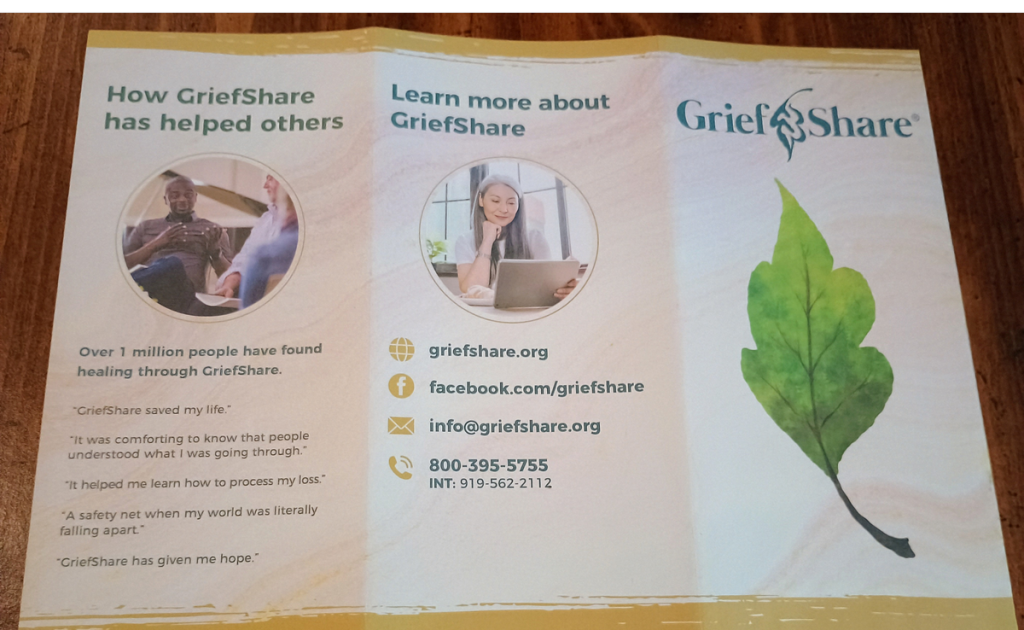
“Classes begin Tuesday evening at Community Christian Church Use the southeast side door. Classes will run from 6:00 p.m. to 8:00 p.m. for 13 weeks beginning August 26th,” said a spokesman, Jon Bailes. “Everyone is welcome and there is no charge except for a workbook.”
“This is a Biblically based program that has been operating with great success at helping people who have lost a loved one.”
Community Christian Church is hosting, but is not responsible.
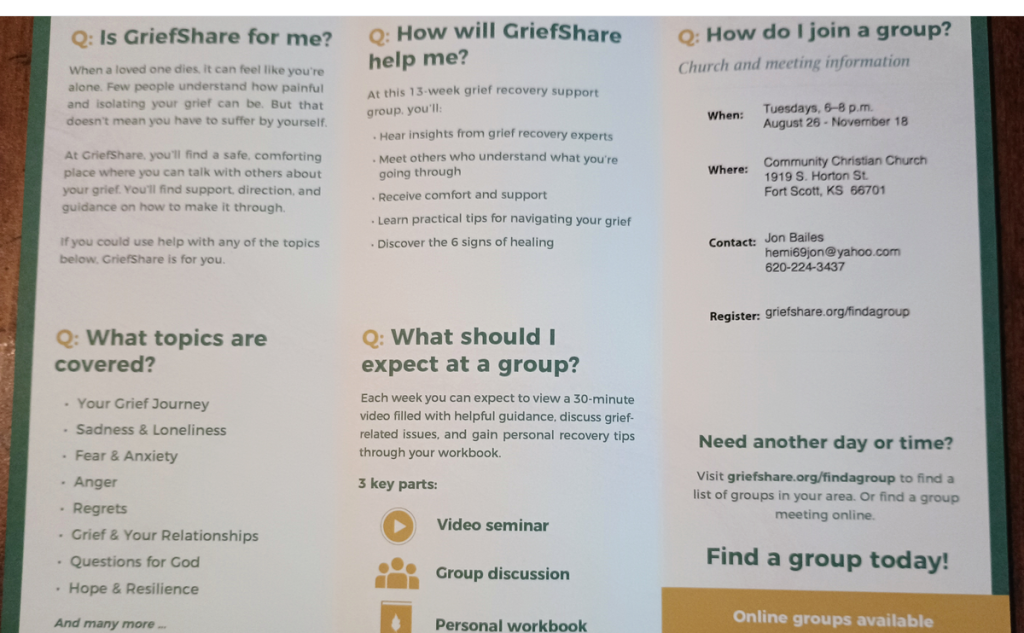
August Parent Empowerment Circle Meeting Reminder
Aug. 18 Bourbon County Commission Agenda
Agenda 08.18.25
Bourbon County Commission Agenda
Meeting Details (Page 1)
- Location: County Commission Chambers, 210 S National Ave.
- Date: August 18, 2025
- Time: 5:30 PM
Agenda Outline (Page 1)
- I. Meeting Opening
- Call Meeting to Order
- Roll Call
- Pledge of Allegiance
- Prayer
- II. Approval of Agenda
- III. Approval of Minutes 08.11.25
- IV. Consent Agenda
- Approval of 08.15.25 Accounts Payable Totaling $177,534.86
- Approval of July Financials
- V. Public Comments for Items Not on The Agenda
- VI. Old Business
- Payroll CIC discussion
- Fence Viewing
- Planning Commission Resolution
- Emerson and Company Agreement
- VII. New Business
- VIII. Commission Comments
- IX. Adjournment
Future Business (Page 1)
- 08/25/25: RNR Hearing, Don Doherty Benefits, Security Cameras, E911-Brad Matkin, Crawkan
- 09/08/25-09/15/25: Vehicle Lease Program, Economic Development, 911 Dispatch Worksession, Juvenile Detention Contract, Sanitation Worksession
- Future: Benefits Committee Letters
Special Meetings (Page 1)
- A special budget work session will be held on August 21, 2025, at 5:30 PM with the Budget Advisory Committee.
- A special meeting with Don Doherty will be held on August 22, 2025, at 5:00 PM.
Information Packet Summary
Executive Sessions (Page 2) The document outlines the permissible reasons for holding executive sessions, citing Kansas Statute KSA 75-4319 (b). These reasons include discussing personnel matters, consulting with an attorney, handling employer/employee negotiations, discussing financial affairs or trade secrets, preliminary discussions for real estate acquisition, and security measures.
Accounts Payable (Pages 3-11) A detailed summary of open invoices by department is provided. The total accounts payable for approval is $177,534.86. The report breaks down the total by various funds and departments, including:
- Appraisers: $770.31 (Page 3)
- County Treasurer Motor Fund: $2,624.83 (Page 3)
- Employee Benefit: $32.02 (Page 3)
- Special Law Enforcement: $600.00 (Page 4)
- Landfill: $22,686.10 (Page 4)
- County Sheriff/Correctional: $18,869.10 (Page 6)
- Noxious Weed: $30.32 (Page 7)
- Road and Bridge: $26,587.64 (Page 9)
- Road & Bridge Sales Tax Fund: $19,037.37 (Page 10)
- Sheriff Trust Forfeiture: $18,570.23 (Page 10)
- BOND SALES TAX – COUNTY JAIL: $13,241.86 (Page 11)
- County Commission: $3,283.23 (Page 12)
Planning Commission Resolution (Pages 19-20) The resolution details the establishment, composition, functions, meetings, and voting procedures for the Bourbon County Planning Commission. A quorum consists of four members, and most matters require a majority vote of the quorum present. The commission is authorized to approve subdivision plats and make recommendations on zoning and planning issues. The county counselor will provide legal representation.
Payroll Processing Information (Pages 201-202) This section is a form for gathering information related to payroll processing, including:
- Whether payroll has been processed in the current year.
- Payroll software used.
- Pay period dates and next check date.
- Frequency of payroll (weekly, biweekly, semi-monthly, monthly, quarterly, or annually).
- Whether paper checks are required.
- A list of possible deductions, such as retirement plans, medical/dental insurance, garnishments, and union dues.
